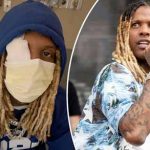Better Call Saul Season 6 Episode 8
The second half of the final season of Better Call Saul opens with a tense episode that brings the characters one step closer to fulfilling their fate and changes the way we look at Breaking Bad forever.
Better Call Saul Review
The cliffhanger of episode 7 was so shocking and heartbreaking that I was glad that the final season was split into two parts. Because I really felt that I needed this 6-week gap to digest the horror I had experienced, to mourn and to repair the deepest wounds that the series had ever inflicted on our psyche. But what “point and shoot” (which can also mean “point and shoot”) does is make it seem like we never went through this recovery period at all. Episode 8 changes this distance from a blessing to a curse. If we had seen this episode immediately after episode 7, we would have been too emotionally numb and shocked to feel all of its pain. Therefore, this period of rest, which has restored our senses and nerves to their former strength and sensitivity, instead of benefiting us, has made us more alert to feel all the pain caused by the relentless emotional blows of this episode.
Why BETTER CALL SAUL Season 6 Episode 8 Was Incredible
Better Call Saul is an American crime and legal drama television series created by Vince Gilligan and Peter Gould.
It is a spin-off and a prequel to Gilligan’s previous series, Breaking Bad. Set primarily in the early to the middle part of the 2000s in Albuquerque, New Mexico, the series develops Jimmy McGill (Bob Odenkirk), an earnest lawyer and former con artist, into an egocentric criminal defense attorney known as Saul Goodman.
Also shown is the moral decline of retired police officer Mike Ehrmantraut (Jonathan Banks), who becomes a career criminal to support his granddaughter and her widowed mother. The show premiered on AMC on February 8, 2015. The sixth and final season consisting of 13 episodes, premiered on April 18, 2022, and is set to conclude on August 15, 2022.
This week’s episode not only violently reopens those festering wounds, it devotes itself from the first frame to the last to sprinkling salt on them.
The mission of this episode in a nutshell is this: If you thought Howard’s death was the most tragic thing you’ve seen in the world of Breaking Bad, we’re going to make it a hundred times more tragic and heartbreaking than you ever imagined. The result is one of those classic Breaking Bad episodes that seems like it’s going downhill without brakes and just keeps getting worse and worse unstoppably. In fact, this episode not only makes Howard’s end more nightmarish, but also single-handedly raises the bar for the overall darkness of the Breaking Bad universe.
One of the things that makes Howard’s death even scarier is Lalo’s motivation for visiting Jimmy and Kim’s apartment. In this episode, we find out that Lalu’s purpose in going to their apartment was not to question them about the reality of what happened in the desert. In fact, Lalo doesn’t care about Jimmy and Kim at all. Jimmy and Kim are nothing more than tools to carry out his master plan. The only thing that makes them an effective tool is that they can’t go to the police because of their love for each other so as not to expose their wrongdoings. This means that if Lalo had access to someone else, he wouldn’t have found out about Jimmy and Kim. This adds to the senseless and unjust nature of Howard’s death as someone who was in the wrong place at the wrong time.
Better Call Saul Season 6 Episode 8 Breakdown : Recap & Review
The world of Breaking Bad is full of similar victims: passengers on planes who crash into each other, Jane’s father, the travel agent who is murdered by Lalo, Drew Sharp (the motorcycle boy), the unsuspecting bystander who is killed in the sequence of the cousins’ attack on Hank, the man. A good man who saves the driver of the Salamancas and is killed by them, etc. What the series does now is that by making Howard a representative of all the victims who never deserved such deaths, it gives a new weight to the evil of the criminals of this world and makes the grief and suffering that their families have endured more palpable to the audience. The parents of that motorcycle boy probably feel the same awful feeling that we are feeling now in Howard’s absence.
The next point is that although we predicted that Howard’s murder would probably be presented as a suicide, it is one thing to predict it, and it is quite another to watch it in action: all of Howard’s friends, colleagues and acquaintances will henceforth see him as a Crazy gun addicts will remember; As someone who couldn’t deal with the mess he brought up, he ended his life because of the shame and damage to his reputation. In the opening flashforward of this episode, there is a cruel contrast between Howard’s “Namaste” license plate and the sea in which he committed suicide. I can imagine that probably Howard’s acquaintances will secretly laugh and laugh at the way Howard died and tell themselves or each other that Howard was pretending with his license plate that he had achieved peace and self-knowledge that in reality he was in a much worse situation than he was. It has been happening.
The way Howard’s body is disposed of is also done in the most humiliating way possible: not only are Mike’s men using the refrigerator to get him out of the apartment (even Jimmy briefly sneaks Mike’s men through the door as they try to force Howard’s body inside). He sees that the refrigerator can’t fit), but he is buried next to Lalu, his murderer.
The result is one of those grotesque images that is indescribably wrong: that the manner of burial and the eternal end of one of the world’s most vicious criminals and one of its most innocent victims are no different from each other, confronting us with a false and empty concept of justice. It leads to one of the most nihilistic moments in the world of Breaking Bad. This moment, however, has a poetic meaning on a macro level: firstly, the burial of the representative of the cartel-oriented half of this world and the representative of its legal half in the same place ties the two halves of the Breaking Bad world together in an inseparable way forever.
Second, this scene turns Gus’ hyperlab into a kind of haunted place in the context of the Orlok Hotel, which was built over a mass grave of massacred Indians. The red floor of the hyperlab during Breaking Bad reminds me of the sequence of blood spurting from the elevator of the Orlok Hotel in Stanley Kubrick’s “The Shining”; It is as if the blood of those who are buried under the super-lab has been soaked. So, every time we rewatch Breaking Bad from now on, on the one hand, our knowledge of Howard buried underneath weighs so undeniably on our minds that it heightens the horror of Walt and Jesse’s presence in this cursed place, and on the other hand, Our awareness of Lalu standing next to him reinforces our astonishment at Gus’s achievement in building and bringing this project to fruition. But “Point and Shoot” is as much about making Howard’s death scarier as it is about creating Jamie and Kim’s most memorable night ever.
Jamie and Kim have proven themselves time and time again to be cool and cunning tricksters; They pretend to be the directors of the most sophisticated and subtle frauds; They are always several steps ahead of their victims and can turn anyone into their puppet without realizing it; Jim and Kim’s consecutive victories have given them the illusion that they are at the top of the food pyramid. Therefore, watching them become the prey of more serious, more predatory and indifferent predators than themselves, watching them become the playthings of those against whom they can do nothing but shake their heads, watching them be reduced to a handful of passive disposable pieces in the game of others, By shattering this illusion, it creates their biggest nightmare. Not only is Jamie’s mouth, his greatest weapon, closed for most of this episode, but Kim, who we saw two episodes ago literally directing Howard’s scandal, is reduced to an actor who has to repeat the script forced upon him by Lalo word for word. Slow repetition has been reduced.
Furthermore, the series avoids providing a loophole for Jamie and Kim to escape their role in Howard’s death or for their fans (if they have fans at all) to justify their role in Howard’s death. Jamie and Kim might try to fool themselves out of guilt and say that if Lalo hadn’t been caught unawares, if Mike had kept his promise to take care of them in the face of Lalo’s threat, their plan to discredit Howard would have succeeded without physical harm. .
But what happens is that Mike uses the lie they told about Howard’s addiction and what they did to publicly embarrass him to cover up Howard’s murder and make his suicide look believable. In other words, even if we can chalk up Lalo and Howard’s confrontation to fate, the fact that Jimmy and Kim’s plan to discredit Howard provides an ideal scenario for getting rid of his body, they are undeniably in the head in addition to his murder. It also involves the destruction of his body. Just as Walt dug a hole with his own hands that turned into Hank’s ready grave, Jimmy and Kim’s plan to destroy Howard’s character turns into a lie ready to make him disappear.
But that brings us to one of the key, or perhaps the most, plot points of “Point and Shoot”: After Lalu leaves the apartment with Jimmy tied up, Jimmy struggles to escape and collapses, empty-eyed. He encounters Howard’s cold and gray skin. Jamie’s bound hands and feet mean that he can no longer resort to self-deception, his usual strategy for dealing with the torment of his heavy conscience; There is no way left for him to fool himself; There is no one to vent his feelings to him; There is no one left to avoid accepting responsibility for his own mistakes by punishing or blaming him.
It is only him and the consequences of his decisions. Howard’s face covers his entire field of vision and the whole time he’s on the ground, he can’t even turn away from it. The result leads to a plot (pictured below) that is paralleled in the character arcs of Walt (after Hank’s death), Gus (after Max’s death), and Jesse (after Andrea’s death): the paralyzing horror of watching the destruction of something dearest. who claimed to care about it, it brings them to their knees in amazement.
But this is not the only thing that Jimmy and Kim have to live with the resulting psychological damage for the rest of their lives: firstly, the expression on Jimmy and Kim’s face in the scene where Kim is leaving the apartment is the expression of those who are in silence forever with They also say goodbye; They are convinced that it is impossible for both of them to survive this fate. The second thing that will forever weigh on their minds is that Jimmy was willing to kill to keep Kim alive, and Kim was willing to kill to keep Jimmy alive. When a person reaches such a point of helplessness that he accepts his death or discovers his own potential to become a killer, it is one of those experiences that will definitely change them irreversibly, and the series will definitely make dramatic use of its psychological consequences in the remaining episodes. will do.
The stars of “Point and Shoot” are Lalo and Gus, who, when the suspension of their conflict had reached the point of being unbearable, eventually collided with each other like two freight trains. One of the things I love about Lollo and Gus’s cat-and-mouse game throughout this episode is that not only does writer Gordon Smith avoid making one of them look stupid in order to make the other look smart, but while narrating their struggle to rise above Each other’s hand refrains from chewing a bite and putting it in the audience’s mouth.
Frank Hauser and Russell Reich, authors of the book “Notes on Directing” say about this: “Don’t always connect scattered pieces of information together. Consider a role for the audience to fill in the blanks of what is happening. In such a way that you give all the scattered pieces of information that the audience needs, but never connect them together instead of the audience.”
For example, when Lalo tells Jamie to knock on Gus’s door and shoot whoever answers the door, our first impression might be that Lalo is either unaware of the tight security measures at Gus’ house or that he is too helpless to do anything. except that he uses the most improbable strategy possible. This strategy makes some sense, at least on paper: the odds that Gus himself would open his door to a strange woman to keep up appearances are slim, but still there. Even so, as soon as we see Lalo in front of Gus’ laundromat, it’s satisfying to know how wrong we’ve been in underestimating Lalo and the show’s success in keeping the gears of our minds spinning while we speculate about Lalo’s true plan. This also applies to Gus’ phone conversation with Kim. Gus is surprised to hear that Jimmy was able to talk Lalo out of sending him.
At first it may seem that Gus is surprised by Jimmy’s skills; It’s like he’s saying to himself, I can’t believe that someone could change the opinion of someone like Lalo Salamanca. But later we find out the opposite: Gus is thinking at this moment that not even Saul Goodman can dissuade Lalo from deviating from his original plan; He is thinking that Lalu himself allowed Jamie to dissuade him; He didn’t care who he sent. Because his main plan was never to kill Gus, but pretending to kill Gus was a means to distract Gus and his people from his main plan.
Another example of the show’s commitment to involving the viewer in its storytelling can be seen in how Gus becomes certain that Lalo entered the laundromat: Gus’s morbid perfectionism and obsessive attention to detail (like brushing his bathroom teeth in this season’s sixth episode) leave him alone. who is able to see the broken washing machine ventilator, making him the only person who can see things that are invisible to others. Just as Gus notices one of the crooked blades of the ventilator, Walt later becomes certain of the threat of his enemy (Crazy-Eight) through one of the missing pieces of the plate.
This is not the only reference to Breaking Bad in this episode. Gus’ character arc in the final season, which sees him at his most vulnerable and shaky yet, plays for him what Breaking Bad season 4 played for Walt. So it is obvious that in “Point and Shoot” we see more psychological and symbolic parallels between Walt and Gus: just as Gus is threatened by Lalo’s gun in the laundromat in this episode, Walt is also threatened in the same laundromat in the third season finale. is placed in a similar, seemingly inescapable predicament by Mike; Just as Walt defeats his invincible opponent by planting a bomb in the place Gus cared most about (Hector’s nursing home), Gus also defeats his invincible opponent by planting a revolver in the very place where Lalo’s thoughts and mentions are directed. (super lab), destroys his stubborn enemy. You can also look at it from this angle: just as Walt overcame the neo-Nazis by hiding a machine gun in the trunk of his car, Gus uses a similar trick to surprise Lalo when he was sure of success (both Amojk and Lalo in The last moments of their lives raise blood).
In addition, as Gus guesses from Jesse’s words about Brock (Andrea’s girlfriend’s son) being poisoned in the penultimate episode of the fourth season of Breaking Bad, that Walt is using Jesse to get him out of his protective shell, in this episode too From his phone conversation with Kim, Gus learns that Lalo is using Kim to destroy the defense forces of the hyperlab. Now, when we revisit Gus’ refusal to get into his bombed car, we know this isn’t the first time someone has used a similar trick to hit him, to penetrate his impenetrable shield.
The last time someone had used this trick on Gus, his late detection almost resulted in his certain death. Therefore, in Breaking Bad he trusts his bad feeling about Brock being poisoned (the poisoning seems like a planned event rather than a random illness) thanks to his past experience, and avoids getting into the car that would lead to his immediate death. he does.
But perhaps the episode’s most interesting reference to Breaking Bad is this: just as Walt sends Jesse against his will in the Season 3 finale of the original series to kill Gale as soon as she opens the door for him, this episode also sends Lalo Kim Against his will, he sends Gus to kill him as soon as he opens the door for him. It is interesting that the Better Call Saul references are not, as usual, among those empty nostalgic references whose only use is to refer to the television with relish in a “Leonardo DiCaprio” way (the biggest problem with the recent films and series “War stars”). Instead, what they do is enhance the dramatic richness of the original series and make us see the events of that series from a new angle. Although the most obvious example is the burial of Howard and Lalo in the superlab, the most subtle example is the parallels between Kim and Jesse.
What happens is this: now knowing that Gus’s previous nemesis used a similar trick to hit him, the show balances our sympathy for Gus and Walt (which until now has been disproportionately heavily on Walt’s side). This means that now in the review of Breaking Bad, as much as Gus plays the role of the antagonist of Walter White’s story, Walter White plays the role of the antagonist of Gus’s story.
Now Walt’s evil is more visible knowing that he used a “Lalo Salamanca” strategy to defeat Gus, and now Gus, instead of the enemy of Walt’s story, is the protagonist of his own story, trying to protect his organization against a more advanced, ruthless and intelligent version. Protecting Lalo Salamanca, it seems. But another moment of this episode where the writers make our awareness of the future into the strong point of the series is when Gus promises Lalo that he will go to Hector and before he dies, he will tell him that he will give every member of his family to sent underground (he fulfills his prophecy in the eleventh episode of the fourth season of the original series).
The point is this: although Gus’s promise may seem authoritative, majestic and exciting independently, the ironic aspect of it in the case of knowing the future is that Gus is actually predicting the manner of his own ignominious and humiliating death with this promise; With his promise to keep Hector alive, he speaks excitedly of protecting the only weapon capable of killing him. That the audience does not glorify a criminal is of particular importance for such a series, and the series makes the most of its pre-revenue to dilute the seemingly magnificent effect of Gus’s prophecy and instead emphasize the absurd truth of it.
In other words, Gus is smart enough to prepare himself in advance to defeat Lalo, but at the same time too stupid to see how Lalo’s self-destructive complex to discover his superlab and humiliate him has helped him read his enemy’s mind and predict his decisions, his own self-destructive complex to humiliate Hector by killing each and every member of his family will become the same weakness that will help his next enemy to read his mind and predict his decisions.
Furthermore, just as our knowledge that everyone in Nacho’s death sequence will be dead in less than five or six years increases the value of his heroic death and the selfless cause for which he died, Gus’s final reminder of the futility of these games. Emphasizes power. The characters in the world of Breaking Bad are always hit by a point where all their thoughts are self-destructively focused, and now Lalo suffers a similar poetic fate: Walt’s attempt to protect his barrels of money becomes his every thought and mention, the pit that He digs to hide them, literally turning into Hank’s grave; Gus’s complex to torment Hector by exterminating his family becomes his life’s mission in such a way that by keeping Hector paralyzed, he creates with his own hands the only weapon capable of destroying him, and now Lalu’s need to expose Gus’s laboratory and humiliate him with Filming him is the Achilles’ heel that drags him under his own feet to where he will be buried forever.
Gus himself cleverly exploits Lalo’s complex to humiliate him to his advantage: he buys himself time by cursing Don Eladio’s drug gang and the Salamancas. As Gordon Smith has confirmed in his interviews, Gus learned this trick from Nacho. Although the Salamancas could kill Nacho immediately, their need to be justified in their hatred, their need to hear all the things they’ve always wanted to become, their desire to absorb all the hatred they need to enjoy torturing Nacho as much as possible, This means that Nacho is allowed to pour out his deepest feelings.
Now in this episode Gus uses a similar tactic to delay his death and create the ideal conditions he needs to surprise his enemy by saying all the things that Lalo always wanted to be confirmed from his own words. Lalo is somehow satisfied by Gus’s confessions, which in his view are a sign of accepting his failure, and he somehow needs each of these insults and greed to increase his pleasure in killing Gus, which lowers his guard for a moment.
But in an episode that is about the characters reaching their unfortunate end or getting closer to their inevitable unfortunate end, Mike is no exception to this rule. Mike’s delusional bubble bursts when he stares at the corpses of Howard and Lalo in a shared grave: the line separating good and evil fades before Mike’s eyes, and he is confronted with the most naked and honest picture of a world of indifference against the uncontrollable human instinct to classify and explain. It resists an eye for an eye: in this world, being Howard is not considered a special plus point, and no one is penalized for being lazy. The universe didn’t protect Howard because he was a good person, and the same universe didn’t punish Lalu because he was a terrible person. Both became victims of forces more ruthless than themselves, and these forces themselves will later become victims of forces more ruthless than them.
The scene where the two are buried next to each other is undeniable physical evidence that makes Mike aware of his self-delusion: Mike likes to believe that he has a set of moral principles and that he is different from the people around him because he is trying to protect the innocents who are not part of the game. Yes, but facing this scene, he realizes that his insistence on morality in a world that does not distinguish between Lalu and Howard is nothing but naive and delusional. It will be impossible to prevent the harming of innocents in a world where the employer only cares about winning, and despite his efforts, he will always be guilty of harming innocents or become the facilitator of the guilt of other criminals. So, now that the water has gone over his head in such a way that he can never leave this lifestyle, it is better to stop the self-deception and embrace his true identity.
In the third season, Mike meets a woman named Anita on the sidelines of his bride’s church talk therapy sessions. Anita explains that one day her husband goes for a walk and never comes back home. Although his car is found, he himself remains lost. He continues: “I don’t know if he slipped and fell, had a stroke or saw someone who had a problem with him, I don’t know. And even after all these years, not knowing how he died or where he is, it was not important to me, but it is important.” Anita’s words affect Mike in such a way that he prepares a metal detector, goes to the place where the infamous bystander who was killed by the Salamancas (remember the story of Mike saving the Salamanca truck driver alive and the passerby who finds him), himself. bothers to search for his burial place and finally calls the police and reports it; In this way, to prevent the poor passerby’s family from speculating about the calamity that has befallen him and to provide a decisive evidence for accepting this calamity.
Now the same Mike, who had put himself to so much trouble to find the body of that good man, has fallen so far that he personally takes action to destroy Howard’s body in a way that will never be found by anyone. Her decision to use Howard’s wallet and wedding ring stems from a similar motive: she wants to make his suicide more believable to those close to her. But the fact is that these actions are nothing more than painful selfish measures to calm the torment of his conscience: probably Howard’s wife will have two reactions upon hearing the news of his suicide and seeing his wedding ring: or upon hearing that after his drug use and scandal in The company has committed suicide. She will be convinced that she made the right decision to break up with this toxic man, or will she feel guilty that she could have prevented her suicide if she had responded to Howard’s efforts to mend their relationship. Both of them are equally terrible.
But the ironic and tragic side of it is that Mike, as a master of making others disappear, suffers a similar fate: he disappears one day while going to the park with his grandson, and the only people who can confirm his definite death are Walt and Todd. And with their deaths, there will be no way for his daughter-in-law and grandson to know what really happened to him. In addition, the police will definitely inform his daughter-in-law about Mike’s criminal activities. As a result, Mike’s daughter-in-law’s respect for him is forever tarnished.
In other words, Mike ends up suffering the same fate he inflicts on Howard in this episode: the destruction of his credibility among those close to him and his disappearance without explanation. So it’s no surprise that in an episode that’s all about recalling Mike’s horrific end, we’ll see him in the same role we first met him in Breaking Bad: as in Breaking Bad, he was preoccupied with making Jane’s strangulation incident seem random. We see Jesse rehearsing the story he has to tell the police, here we see him making Howard’s murder look like suicide and rehearsing the story Jamie and Kim have to tell the police. With the difference that, unlike here, where a bit of guilt, anger and disgust can be recognized on his face, at the beginning of his appearance in Breaking Bad, he fits into his role in such a way that he covers up Jane’s death as an employee of a government office in the most indifferent and boring way possible. .











